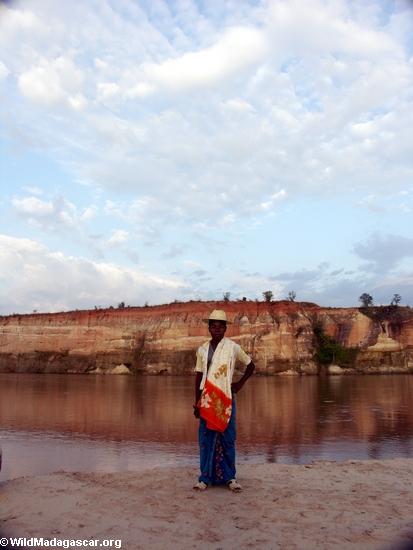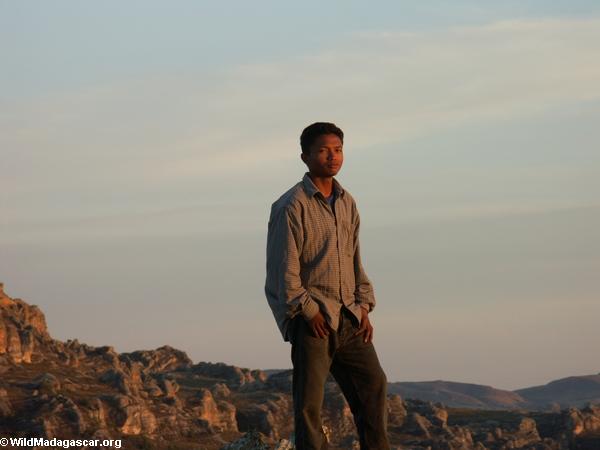People of Madagascar have origins in Borneo, Africa
New study confirms unusual ancestry of the Malagasy
Sailing across the Indian Ocean to make landfall on the world's fourth largest island?
Rhett Butler, mongabay.com
May 3, 2005

An ethnic Sakalava boy near the Manambolo River in western Madagascar. Sakalava usually have African features.

Benja Ramanandoria, an ethnic Merina, near the Isalo National Park in western Madagascar. Merina generally have features characteristic of Indonesian ancestry.
A new study in the American Journal of Human Genetics confirms that the people of Madagascar have origins in both East Africa and also distant Borneo.
Despite the island's proximity to southern Africa, some anthropologists believe it was ethnic Indonesians who first settled Madagascar 1500-2000 years ago. The language of Madagascar, called Malagasy, can be traced back to Indonesia where it most closely resembles the modern Malayo-Polynesian language of Ma'anyan, which is spoken by people in the Barito Valley of southern Borneo. Some anthropologists postulate that these Indonesians could have either sailed directly across the Indian ocean -- possible given the sailing prowess of these people -- or gradually made their way along the coast of South Asia eventually finding their way to the island, which is the fourth largest in the world. On the way, these intrepid explorers could have mixed with mainland Africans or Africans may have arrived at a later date.
Regardless of who set foot first on the island, most experts agree that Madagascar's inhabitants arrived relatively recently. There is no evidence of a stone age in Madagascar and the island was settled around the time Polynesians reached the planet's most isolated place -- Easter Island. It is thought that subsequent migrations have brought other groups (Arabs and Indians) into the ethnic and cultural mix.
The study
The study, led by a team of geneticists at the universities of Cambridge, Oxford and Leicester examined both the Y chromosomes of Madagascar residents -- inherited essentially unchanged from father to son -- and the mitochondrial DNA, which is passed directly from mothers to their children. Tiny mutations in these two forms of DNA can help scientists trace human migration and inheritance.
Benja Ramanandoria, an ethnic Merina, near the Isalo National Park in western Madagascar. Merina generally have features characteristic of Indonesian ancestry.
The researchers found that as a whole, Malagasy people (both the name of the language and the people of Madagascar) are a roughly 50:50 mix of two ancestral groups: Indonesians and East Africans. Today, this mixed origin has produced an interesting set of cultures that draws from southeast Asia, India, Africa, and the Middle East.
Diverse society
Within Madagascar there is a great deal of variation between ethnic groups from the Indonesian-looking Merina in the highlands to Arabic Antaimoro on the eastern coast to the African Sakalava in the south and west of the country. Despite these differences, the Malagasy language is spoken throughout the country, something which is a bit surprising given the size and ethnic diversity of the island. Sharing a common language is the strongest bond between Malagasy -- people's physical appearance, religious practices, and traditions are highly regional.
Malagasy language
Malagasy only recently become a written language. Until Welsh missionaries transcribed the language in the 1820s, the Malagasy had to rely on oral history to mark past events. However, even with the development of a written form, written Malagasy hardly resembles spoken Malagasy -- the last syllable is typically dropped while unstressed syllables in the middle of words often disappear (spelling versus pronunciation was evidently influenced by the Welsh transcribers). The capital city of Antananarivo is pronounced "Tananarive" but usually shortened to "Tana."
Cultural richness
What this all means is the people of Madagascar have a remarkable ancestry. One that has produced a unique set of customs and extraordinary cultural richness. Madagascar is a place where ancestors are as much a part of the present day as they are of the past; where in many areas taboo and tradition takes precedence over the law; and western-style religion is freely mixed with beliefs in sorcery and unparalleled funerary customs.
This article used information from WildMadagascar.org, Reuters, and the American Journal of Human Genetics. For further reading on the people of Madagascar I highly recommend The Eighth Continent by Peter Tyson.







0 comments:
Post a Comment